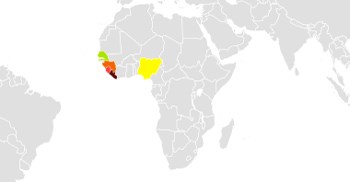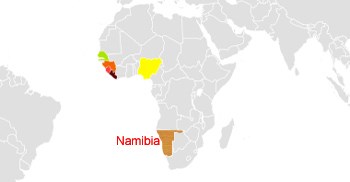African tourism acts to shake off Ebola stigma
Some 56 million tourists visited Africa in 2014, a 2% rise from the previous year, according to UNWTO figures, but growth in Africa lagged behind that in Europe, Asia or the Americas.
Africa had seen a robust 4.8% increase in tourists a year earlier.
"Africa... did well (last year) in spite of suffering from the Ebola symptoms which were associated unfairly" with Africa as a whole, Taleb Rifai, head of the UN World Tourism Organisation (UNWTO), said at the Berlin tourism fair (ITB).
He said Africa needed support, especially after the Ebola crisis, adding: "It was very unfair the generalisation that happened."
Marie France Adieme-N'Dja, of Ivory Coast's tourism office, told AFP that Ebola had created panic.
"We have operators who have had cancelled bookings because of the fear of Ebola. However in Ivory Coast there has not been a single case," she said.
Showing off its nine national parks and 550km of sunny beaches, the Ivorian tourist office is one of many African stands at the ITB trying to woo back visitors as the epidemic appears to have been brought under control.

Almost 24,000 people have been infected with the Ebola virus since December 2013, almost all in Liberia, Guinea and Sierra Leone, and 9,807 of them have died, according to the WHO.
The countries at the centre of the Ebola epidemic are forecast to lose 12% of their combined gross domestic product this year, according to World Bank estimates.
Africa's association with Ebola however has spread much further than the western part of the continent actually affected.
"There was an impact (from Ebola), we got a few cancellations," a tourism professional from a Kenyan tour operator, who declined to be identified, said at the ITB, which runs until Sunday.
He bemoaned that some customers made up their minds not to go to Africa without inquiring more deeply about Ebola.
"The distance between South Africa and West Africa, or Kenya and West Africa, is further away than the distance between West Africa and North America even," Rifai, UNWTO's secretary general, pointed out.
Industry experts from Namibia - a popular safari destination for Germans in particular - at the fair were keen to press home a similar message.

Digu Naobeb, chief executive of the Namibia Tourism Board, said he had resorted to using a map since the Ebola outbreak to point out to tour operators exactly where his country is located.
"In fact, Europeans are closer to the epicentre of Ebola than Namibia," he said.
As a result of acting quickly to try to allay people's fears about Ebola, he said tourism to Namibia had seen "a bit of a decline but not very significant".
One initiative set up by several tourism organisations to combat "geographical ignorance" is the website unite4westafrica.org to promote a positive image of West Africa.
It also sets out to whet visitors' appetites for countries in the region that have not been touched by Ebola, such as Senegal, Benin or Burkina Faso.
In Sierra Leone, tourism had just started to take hold after the decade-long civil war in the 1990s.
Tourist numbers had been rising by more than 10% every year since the early 2000s, albeit from a very low starting point, but the figure collapsed by 46% last year, according to the UNWTO.
Among those from the Sierra Leonean tourism sector who have travelled to Berlin to try to reverse the trend, Tourism Minister Kadija O. Seisay urged airlines to resume services to the capital, Freetown.
Ebola, one of the deadliest pathogens known to humans, is spread through direct contact with the bodily fluids of an infected person showing symptoms such as fever or vomiting.
It causes often fatal haemorrhaging, organ failure and severe diarrhoea.
Source: AFP, via I-Net Bridge
Source: I-Net Bridge

For more than two decades, I-Net Bridge has been one of South Africa’s preferred electronic providers of innovative solutions, data of the highest calibre, reliable platforms and excellent supporting systems. Our products include workstations, web applications and data feeds packaged with in-depth news and powerful analytical tools empowering clients to make meaningful decisions.
We pride ourselves on our wide variety of in-house skills, encompassing multiple platforms and applications. These skills enable us to not only function as a first class facility, but also design, implement and support all our client needs at a level that confirms I-Net Bridge a leader in its field.
Go to: http://www.inet.co.zaRelated
Africa's hotel boom: Development pipeline grows by 13.3% 7 Apr 2025 Chevron also comes up short in Namibia energy exploration 16 Jan 2025 Shell pulls out of Namibia oil discovery 9 Jan 2025 Irvine Partners announces German expansion and launches dedicated travel and tourism division 1 Aug 2024 Inaugural Global African Hydrogen Summit seeks to unite H2 leadership 30 Apr 2024 Galp Energia says Mopane oil field contains 10bn barrels 22 Apr 2024






















